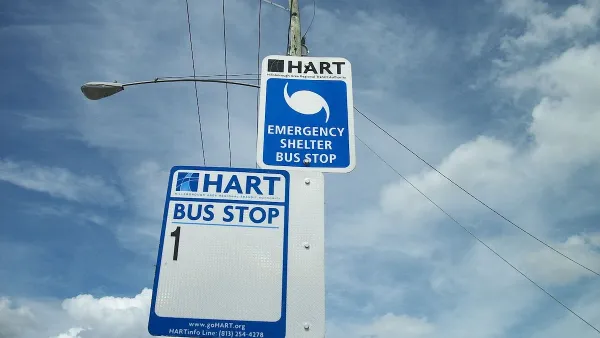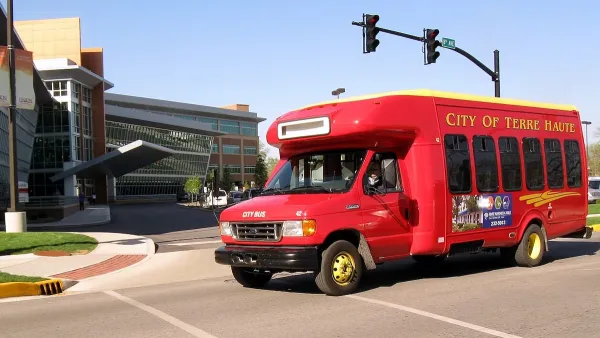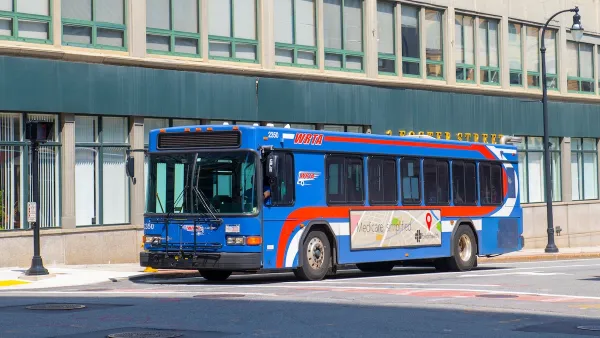Jean-Francois Mayet, the mayor of Châteauroux, introduced free ridership in a bid to turn around his town's failing transit system. Eleven years later, total ridership has increased 208 percent. Henry Grabar examines whether free transit is scalable.
Châteauroux isn't the first city to offer free public transportation, but it's the first example of a large city to do so. Henry Grabar observes, "the otherwise ordinary French town has become a canary in the coal mine of transportation policy, closely watched by the dozens of other municipalities in various stages of free transit experiments." A French report [PDF] released this year found that per person ridership in Châteauroux is up from 21 to 61 trips a year; and the city turned a profit in '03, '04, '05, and '07, after eliminating bus fares in 2001.
"The motivations for making a transit system free are obvious," writes Grabar. "Increased ridership can relieve traffic, improve the environment, boost the system's efficiency, give residents more spending money, help the poor, and rejuvenate central business districts." The results of free mass transit in Châteauroux have been positive, but "[t]here were growing pains: the number of slashed or tagged seats grew from a dozen in 2001 to 118 in 2002. Drivers complained that passengers treated the bus like a personal car, expecting to be dropped off at their doorsteps."
Bruno Cordier, author of a 2007 report Totally Free Mass Transit [PDF], attributes Châteauroux's success to not only free ridership, but also the simultaneous expansion of its transit network. He cautions that "[g]ratuity alone does not make the network attractive" and argues that "the system won't work at all in big cities, where 30-40 percent of transit revenue comes from ticket sales, as opposed to a mere 14 percent in Châteauroux."
The demonetization of the transit system in Aubagne (pop 100,000) has also proven successful, but the verdict on whether the same can happen in big cities will soon be put to the test. "At the end of this year," reports Grabar, "Tallin, Estonia (pop. 406,000) will eliminate fares on its transit system for residents, making it the world's biggest city with free mass transit."
FULL STORY: What Really Happens When a City Makes Its Transit System Free?

Analysis: Cybertruck Fatality Rate Far Exceeds That of Ford Pinto
The Tesla Cybertruck was recalled seven times last year.

National Parks Layoffs Will Cause Communities to Lose Billions
Thousands of essential park workers were laid off this week, just before the busy spring break season.

Retro-silient?: America’s First “Eco-burb,” The Woodlands Turns 50
A master-planned community north of Houston offers lessons on green infrastructure and resilient design, but falls short of its founder’s lofty affordability and walkability goals.

Test News Post 1
This is a summary

Analysis: Cybertruck Fatality Rate Far Exceeds That of Ford Pinto
The Tesla Cybertruck was recalled seven times last year.

Test News Headline 46
Test for the image on the front page.
Urban Design for Planners 1: Software Tools
This six-course series explores essential urban design concepts using open source software and equips planners with the tools they need to participate fully in the urban design process.
Planning for Universal Design
Learn the tools for implementing Universal Design in planning regulations.
EMC Planning Group, Inc.
Planetizen
Planetizen
Mpact (formerly Rail~Volution)
Great Falls Development Authority, Inc.
HUDs Office of Policy Development and Research
NYU Wagner Graduate School of Public Service




























